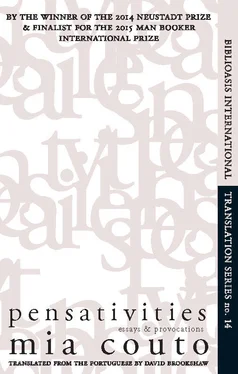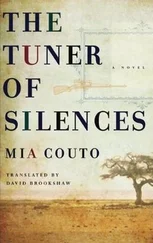I’d already seen this when I was a journalist myself. The journalist credits himself with a mission, and this mission bears a remarkable similarity to a military operation: there is a need to conquer an audience, and bombard it with news in a premium timespan that is calculated down to the very second. The journalist is on top of what is happening as if the event were a precise target. The event is the prey of that spider who is the reporter, in this web of news that envelops the planet.
We drove for about half an hour and when we stopped, I found myself in the middle of the Polana Caniço area, on the edge of a huge hole. It was the biggest hole I’d ever seen — not that I’m a specialist in holes, but Mozambicans have a credible level of expertise when it comes to cratered roads.
The side of a hill in the so-called Maputo “barreiras,” or cliffs, had collapsed during the cyclone, opening up a crater of some fifteen metres in depth and wider than the eye could see. I later learned that more than 27,000 cubic metres of sand had been lost as a result of the hillside’s collapse. I was therefore on the edge of an abyss, as if the earth had been swallowed up by the earth itself. My fear was indescribable: I’d just published The Last Flight of the Flamingo and, in that story, an entire country disappeared, swallowed up by the earth. Just like one of the book’s characters, I was on the brink of an abyss that devoured entire nations.
On the edge of the crater, as if under the volcano of so-called “news,” the technicians from the BBC had set up an even more surrealist scene. They had closed off an area of some thirty square metres with a yellow tape on which were written the words “NO ENTRY.” In the middle of the darkness, they had opened up an illuminated space like a stage bathed in an intense light, in a world in which only that which can be turned into a spectacle is visible.
On one side, there was a whole panoply of machines, generators, flashlights, transmission hubs, satellite phones, hundreds of cables and wires. It was like a football stadium, with the floodlights directed at an empty centre. Around this floodlit terrain, hundreds of spectators drawn there by curiosity were seated, in a state of animated excitement. Suddenly, an area where nothing ever happened seemed to have become the centre of the technological world.
As I drew near and advanced through the crowd, I noticed there was a discussion taking place. Different opinions jostled with one another:
“Is this a cinema, are they making a film?”
“No,” others said, “it’s an operation to fill the hole.”
“Wow! The government’s doing a good job, the hole was only opened up yesterday, and the engineers are already here with their machines.”
When I crossed the yellow tape, it was as if I suddenly became someone from another world. All eyes were focussed on me, and a deep silence descended. I had breached the forbidden line and penetrated an illuminated world. Suddenly, a youngster jumped up and pointed to me, shouting:
“Hey, folks! Didn’t I say this was a cinema? That guy over there is Chuck Norris!”
This gave rise to an immediate lively ruckus. Chuck Norris — a kind of 007 for the underdeveloped world — was right there in the middle of Polana Caniço? At first, some remained skeptical. But then, there was general clamour. And the crowd shouted at me, waving their arms, showing me their children. Some more daring youngsters weaved vigorous karate blows, freeing themselves from invisible enemies, showing me that my martial art skills didn’t just figure on the cinema screen.
The interview was about to begin and technicians were attaching wires, microphones and earphones to me, when the program’s producer realized it would be impossible to record anything in the middle of such an uproar. In a panic, they asked me to address the crowd and ask them to be quiet. I walked over to the people and asked them not to make a noise. Their reaction was immediate:
“Wow! The fellow speaks Portuguese! Hey, Chuck Norris pal, ask those guys to fill in this hole!”
Then, there was a flood of requests. The road needed repairing, they needed a health centre, a school, houses. I should put an end to all the robberies round here, I could do that in the twinkling of an eye. Everything needed to be done urgently. I couldn’t undo the illusion. I left any explanations for later. For the time being, we urgently needed silence. And this was obtained thanks to a surprising misunderstanding that conferred upon Norris a level of respect not shown to mere mortals. I went back into the circle of light and they loaded me down out again with all the technology. Once again, there were the wires, the earphone, the lights, the camera test. We were already connected to London and I was having a preparatory chat with the interviewer when, in the middle of the crowd, a young man with a bottle of beer in his hand, got up and shouted:
“Hey, brothers! That guy there isn’t Chuck Norris. I know that dude: it’s Mia Couto.”
In an instant, the chaos resumed. Everyone debated my true identity at the tops of their voices. Yet again, the British freed me from my wires and begged me to ask for silence. Over to the edge of the lit area I went, and like a preacher, uttered my appeal. But it was an almost impossible mission. Someone asked me:
“Mia Couto, why were you pretending to be Chuck Norris?”
At this point, a tall boy carrying a backpack, emerged from the mass of human beings and waving some sheets of paper, challenged me:
“Mister Writer, do you want me to make sure everyone’s quiet? Leave it to me. But you’ll owe me a favour afterwards.”
There was nothing else for it but to accept. But I needed to know what I was agreeing to. When I asked him, the young fellow explained:
“The favour I want is for you to correct this book I’ve written.”
Our agreement was signed and sealed immediately. The lad must have had some influence over all the others because everyone stopped talking when he waved his arms. Then, he stepped forward with great care so as not to tread on anyone and handed me a sheaf of handwritten papers. On the cover was written: The Panel Beater’s Manual !
I tucked the papers under my arm and went back to the spot where I was going to be interviewed. The journalists were in a state of panic, and there was no time for rehearsals, instructions, preliminaries, anything. It was a question of hitching me up to the wires and starting. It must have been the worst interview I’d given in my life. Surrounded by a cloud of crickets that had been attracted by the lights, hugging the future Panel Beater’s Manual , and still glimpsing one or two youngsters waving to me or practising kung-fu, I wasn’t even aware of whether I was really speaking English.
Today, as I recall this episode, I think about that place, in the middle of the suburban shanties, about that frontier between light and darkness, and how it symbolized the dividing line between two worlds — the real world and that other, digitalized world. And there I was hopping across this dividing line like a smuggler. But only I and one or two Mozambican technicians were able to cross it. The others were prisoners within this frame of invisibility and silence. The same lights that illuminated me within that virtual space, cast the surrounding world into darkness, obscuring that place where the deep heart of Mozambique pulsates.
Lecture to the Conference of the Mozambican
Telecommunications Company (TDM) on the Globalization
of Technology in a Computerized World, Maputo, April, 2001.
Citizenship in Search of its City
Defining the Terms
The theme of this seminar is “The Construction of Citizenship in Mozambique.” It’s important for us to begin by sketching out a set of generally agreed markers and by initiating dialogues based on the same definitions, with a common understanding of words and concepts.
Читать дальше












